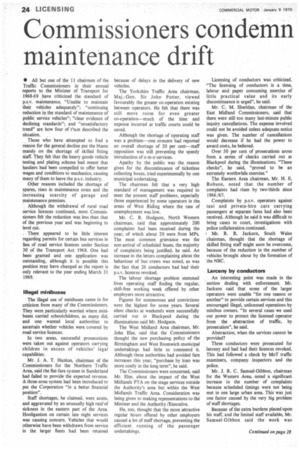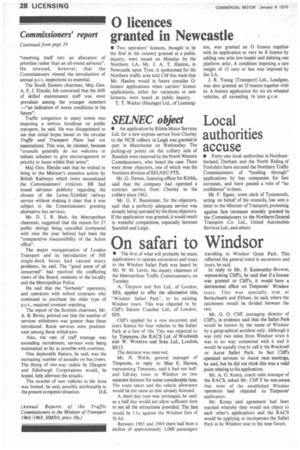Commissioners condemn maintenance drift
Page 30

Page 34

If you've noticed an error in this article please click here to report it so we can fix it.
• All but one of the 11 chairmen of the Traffic Commissioners in their annual reports to the Minister of Transport for 1968-69 have criticized the standard of p.s.v. maintenance. "Unable to maintain their vehicles adequately"; "continuing reduction in the standard of maintenance of public service vehicles"; "clear evidence of declining standards"; and "unsatisfactory trend" are how four of them described the situation.
Those who have attempted to find a reason for the general decline put the blame mainly on the shortage of skilled fitting staff. They felt that the heavy goods vehicle testing and plating scheme had meant that hauliers had been compelled to offer better wages and conditions to mechanics, causing many of them to leave the p.s.v..industry.
Other reasons included the shortage of spares, rises in maintenance costs and the increasing scarcity of garage and maintenance premises.
Although the withdrawal of rural road service licences continued, most Commissioners felt the reduction was less than that of the previous year and was beginning to level out.
There appeared to be little interest regarding permits for certain bus services in lieu of road service licences under Section 30 of the Transport Act 1968. One had been granted and one application was outstanding, although it is possible this position may have changed as the report is only relevant to the year ending March 31 1969.
Illegal minibuses The illegal use of minibuses came in for criticism from many of the Commissioners. They were particularly worried where minibuses carried schoolchildren, as many did, and one wanted local authorities to ascertain whether vehicles were covered by road service licences.
In two areas, successful prosecutions were taken out against operators carrying children in excess of vehicles' legal capabilities.
Mr. J. A. T. Hanlon, chairman of the Commissioners for the Northern Traffic Area, said the flat-fare system in Sunderland had failed to provide the expected revenue. A three zone system had been introduced to put the Corporation "in a better financial position".
Staff shortages, he claimed, were acute, and aggravated by an unusually high rateof sickness in the eastern part of the Area. Hooliganism on certain late night services was causing concern. Vehicles that would otherwise have been withdrawn from service in the larger fleets had been retained because of delays in the delivery of new vehicles.
The Yorkshire Traffic Area chairman, Maj.-Gen. Sir John Potter, viewed favourably the greater co-operation existing between operators. He felt that there was still more room for even greater co-operation—much of the time and expense incurred at traffic courts could be saved.
Although the shortage of operating staff was a problem—one concern had reported an overall shortage of 20 per cent—staff opposition was still preventing the speedy introduction of o-m-o services.
Apathy by the public was the reason given for the discontinuance of ticketless collecting boxes, tried experimentally by one municipal undertaking.
The chairman felt that a very high standard of management was required to meet the present staff problems, especially those experienced by some operators in the areas of West Riding where the rate of unemployment was low.
Mr. C. R. Hodgson, North Western chairman, said that approximately 200 complaints had been received during the year, of which about 20 were from MPs. The most common grievance was the non-arrival of scheduled buses, the majority of complaints being justified, he said. An increase in the letters complaining about the behaviour of bus crews was noted, as was the fact that 26 conductors had had their p.s.v. licences revoked.
The labour shortage problem stemmed from operating staff finding the regular. shift-free working week offered by other employers more attractive.
Figures for summonses and convictions were the highest for some years. Several silent checks at weekends were successfully carried out in Blackpool during the illuminations said Mr. Hodgson.
The West Midland Area chairman, Mr. John Else, said that the Commissioners thought the new purchasing policy of the Birmingham and West Bromwich municipal undertakings had little to commend it. Although these authorities had avoided fare increases this year, "purchase by loan was more costly in the long term", he said.
The Commissioners were concerned, said Mr. Else, about the impact of the West Midlands PTA on the stage services outside the Authority's area but within the West Midlands Traffic Area. Consideration was being given to making representations to the Minister and the Authority/Executive.
He. too, thought that the more attractive regular hours offered by other employers caused a lot of staff shortage, preventing the efficient running of the passenger undertakin gs. Licensing of conductors was criticized. "The licensing of conductors is a time, labour and paper consuming exercise of little practical value and its early discontinuance is urged", he said.
Mr. C. M. Sheridan, chairman of the East Midland Commissioners, said that there were still too many last-minute public inquiry cancellations. The expense involved could not be avoided unless adequate notice was given. The number of cancellations would decrease if he had the power to award costs, he believed.
Over 50 per cent of prosecutions arose from a series of checks carried out at Blackpool during the illuminations. "These checks", he said, "proved to be an extremely worthwhile exercise."
The Eastern Area chairman, Mr. H. E. Robson, noted that the number of complaints had risen by two-thirds since 1966 /67.
Complaints by p.s.v. operators against taxi and private-hire cars carrying passengers at separate fares had also been received. Although he said it was difficult to bring cases to court, investigations with police collaboration continued.
Mr. R. R. Jackson, South Wales chairman, thought that the shortage of skilled fitting staff might soon be overcome, because of the reduction in the number of vehicles brought about by the formation of the NBC.
Larceny by conductors An interesting point was made in the section dealing with enforcement. Mr. Jackson said that some of the larger operators were unable "for one reason or another" to provide certain services and this encouraged illegal, unlicensed operations by minibus owners. "In several cases we used our power to protect the licensed operator from the abstraction of traffic, by prosecution", he said.
Abstraction, when the services cannot be provided?
Three conductors were prosecuted for larceny and had had their licences revoked. This had followed a check by MoT traffic examiners, company inspectors and the police.
Mr. J. R. C. Samuel-Gibbon, chairman for the Western Area, noted a significant increase in the number of complaints because scheduled timings were not being met in one large urban area. This was just one factor caused by the very big problem of staff shortages.
Because of the extra burdens placed upon his staff, and the limited staff available, Mr. Samuel-Gibbon said the work was "resolving itself into an allocation of priorities rather than an all-round advance". He stressed, however, that the Commissioners viewed the introduction of annual p.s.v. inspections as essential.
The South Eastern chairman, Maj.-Gen. A. F. J. Elmslie, felt concerned that the drift of skilled maintenance staff was most prevalent among the younger members —"an indication of worse conditions in the future".
Traffic congestion in many towns was imposing a serious handicap on public transport, he said. He was disappointed to see that initial hopes based on the circular Traffic and Transport Plans had not materialized. This was, he claimed, because "councils generally do not welcome or initiate schemes to give encouragement or priority to buses within their areas".
Maj.-Gen. Elmslie said that he wished to bring to the Minister's attention action by British Railways which twice necessitated the Commissioners' criticism. BR had issued advance publicity regarding the closure of the Lewes /Uckfield railway service without making it clear that it was subject to the Commissioners granting alternative bus services.
Mr. D. I. R. Muir, the Metropolitan chairman, suggested that the reason for 27 public sittings being cancelled (compared with nine the year before) had been the "comparative inaccessibility of the Acton office".
The major reorganization of London Transport and its introduction of 36ft single-deck buses had caused many problems, he said. The "good sense of all concerned" had resolved the conflicting views of the Board, residents in the locality and the Metropolitan Police.
He said that the "kerbside" operators, and operators with school contracts who continued to purchase the older type of p.s.v., required constant watching.
The report of the Scottish chairman, Mr. A. B. Birnie, pointed out that the number of services withdrawn was greater than those introduced. Rural services were predominant among those withdrawn.
Also, the rate of staff wastage was exceeding recruitment; services were being maintained so far as possible with overtime.
One deplorable feature, he said, was the increasing number of assaults on bus crews. The fitting of two-way radios by Glasgow and Edinburgh Corporations would, he hoped, help alleviate the attacks.
The number of new vehicles in the Area was limited, he said, possibly attributable to the present ecoqomic situation. 1/5. • Two operators' licences, thought to be the first' in the country granted at a public inquiry, were issued on Monday by the Northern LA, Mr. J. A. T. Hanlon, in Newcastle upon Tyne. A spokesman for the Northern traffic area told CM this week that Mr. Hanlon would in future consider 0licence applications when carriers' licence applications, either for variations or new licences, were heard at public inquiry.
T. T. Walker (Haulage) Ltd., of Learning ton, was granted an 0 licence together with its application to vary its B licence by adding one artie low-loader and deleting one platform artic. A condition imposing a tare weight of 15 tons or less was imposed by the LA.
J. R. Young (Transport) Ltd., Leadgate, was also granted an 0 licence together with its A-licence application for six six-wheeled vehicles, all exceeding 16 tons g.v.w.








































































































